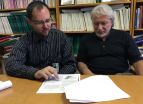INFORMATION:
http://www.aerzteblatt.de/pdf.asp?id=169418
Hodgkin's lymphoma: The treatment can have late sequelae
2015-05-27
(Press-News.org) Hodgkin's lymphoma--cancer of the lymph nodes--arises in more than 150 children and adolescents in Germany each year. Nine out of ten patients survive the disease, thanks to the highly effective treatments that are now available. Depending on the type of treatment given, however, there may be late sequelae, as discussed by Wolfgang Dörffel and colleagues in an original article in the current issue of Deutsches Ärzteblatt International (Dtsch Arztebl Int 2015; 112: 320-7). These authors studied the question of which types of treatment were more likely to be followed by the development of secondary malignant neoplasia, and they quantified the risk of such an event as a function of the treatment received.
Hodgkin's lymphoma is usually treated with both chemotherapy and radiotherapy. Depending on the particular combination of agents used, and on the intensity of treatment, some patients develop other types of cancer years afterward; for example, some patients treated with radiotherapy later develop malignant neoplasms as a consequence of their treatment. Overall, one in every four or five patients treated for Hodgkin's lymphoma in childhood or adolescence developed a second type of cancer within 30 years of treatment. The authors recommend that patients be informed about the possible late sequelae of treatment and undergo regular follow-up. Moreover, radiotherapy in children and adolescents should be given at reduced doses or avoided entirely.
ELSE PRESS RELEASES FROM THIS DATE:
Similarities between aurorae on Mars and Earth
2015-05-27
An international team of researchers has for the first time predicted the occurrence of aurorae visible to the naked eye on a planet other than Earth.
Mars' upper atmosphere may be indeed closer to Earth's than previously thought. Researchers showed that the upper atmosphere of Mars glows blue depending on the activity of the Sun. The result was achieved through numerical simulation and a laboratory experiment, called the Planeterrella, used to simulate the aurora. The study was published in the leading planetology publication Planetary and Space Science on 26 May.
'The ...
How container-grown plants capture sprinkler irrigation water
2015-05-27
GAINESVILLE, FL -- As the container nursery industry faces severe restrictions on water use, researchers are looking to identify ways to minimize watering needs and eliminate excess watering. The authors of a new study say that understanding container-grown plants' capacity to "capture" sprinkler irrigation water can give growers important tools that help them adjust irrigation rates, reduce water use, and produce healthy plants.
Jeff Million and Thomas Yeager from the Department of Environmental Horticulture at the University of Florida say that there has been limited ...
Flood aftermath linked to post-traumatic stress: Queensland University of Technology study
2015-05-27
Brisbane flood victims suffered more psychological distress during the rebuilding phase than as waters inundated their homes and businesses, a Queensland University of Technology study has found.
Kelly Dixon, from QUT's School of Psychology and Counselling, has looked at the mental health impacts caused by the Brisbane 2011 and the Mackay 2008 flood disasters.
"The findings showed that aftermath stress contributed to poor mental health outcomes over and above the flood itself, prior mental health issues and demographic factors," Ms Dixon said.
Presenting her findings ...
Strength-based parenting improves children's resilience and stress levels
2015-05-27
In a groundbreaking study published recently in the Journal Psychology, Professor Lea Waters from the Melbourne Graduate School of Education outlines how children can draw on their personal strengths to cope with the demands that lead to stress.
"While some stress such as toxic stress caused by a long lasting intense negative experience can have a debilitating effect on the wellbeing of children, not all stress is bad or damaging," Professor Waters said.
"Positive stress is a normal part of the developmental process. When managed well, it has the potential to help children ...
Cooperation among viral variants helps hepatitis C survive immune system attacks
2015-05-27
Warring armies use a variety of tactics as they struggle to gain the upper hand. Among their tricks is to attack with a decoy force that occupies the defenders while an unseen force launches a separate attack that the defenders fail to notice.
A study published earlier this month in the journal Proceedings of the National Academy of Sciences suggests that the Hepatitis C virus (HCV) may employ similar tactics to distract the body's natural defenses. After infecting patients, Hepatitis C evolves many variants, among them an "altruistic" group of viral particles that appears ...
A new era for genetic interpretation
2015-05-27
Millions of genetic variants have been discovered over the last 25 years, but interpreting the clinical impact of the differences in a person's genome remains a major bottleneck in genomic medicine. In a paper published in The New England Journal of Medicine on May 27, a consortium including investigators from Brigham and Women's Hospital (BWH) and Partners HealthCare present ClinGen, a program to evaluate the clinical relevance of genetic variants for use in precision medicine and research.
"We're dealing with massive amounts of information: more than 80 million genetic ...
ACMG says ClinGen will be critical resource for interpretation of genome-scale testing
2015-05-27
Tremendous advances have been made in decoding the human genome in recent years but critical questions remain regarding what these variants mean and how they can be applied in clinical practice. In a comprehensive paper to be published in The New England Journal of Medicine on May 27, 2015, "ClinGen: The Clinical Genome Resource," a consortium including investigators from the American College of Medical Genetics and Genomics (ACMG) provide a detailed overview of ClinGen, an NIH-supported program to evaluate the clinical relevance of genetic variants for use in precision ...
Eating a Mediterranean diet could cut womb cancer risk
2015-05-27
Women who eat a Mediterranean diet could cut their risk of womb cancer by more than half (57 per cent), according to a study published today (Wednesday) in the British Journal of Cancer*.
The Italian researchers looked at the diets of over 5,000 Italian women to see how closely they stuck to a Mediterranean diet and whether they went on to develop womb cancer**.
The team broke the Mediterranean diet down into nine different components and measured how closely women stuck to them. The diet includes eating lots of vegetables, fruits and nuts, pulses, cereals and potatoes, ...
Glacier changes at the top of the world
2015-05-27
If greenhouse-gas emissions continue to rise, glaciers in the Everest region of the Himalayas could experience dramatic change in the decades to come. A team of researchers in Nepal, France and the Netherlands have found Everest glaciers could be very sensitive to future warming, and that sustained ice loss through the 21st century is likely. The research is published today (27 May) in The Cryosphere, an open access journal of the European Geosciences Union (EGU).
"The signal of future glacier change in the region is clear: continued and possibly accelerated mass loss ...
False breast cancer alarm has negative impact on health
2015-05-27
The psychological strain of being told that you may have breast cancer may be severe, even if it turns out later to be a false alarm. This is the finding of new research from the University of Copenhagen, which has just been published in the scientific journal Annals of Family Medicine. Researchers call for improving screening accuracy, thus reducing the number of false-positive mammograms.
It was a false alarm. You don't have breast cancer. This ought to be a happy message for women who have been through a mammography screening which initially showed signs of something ...


